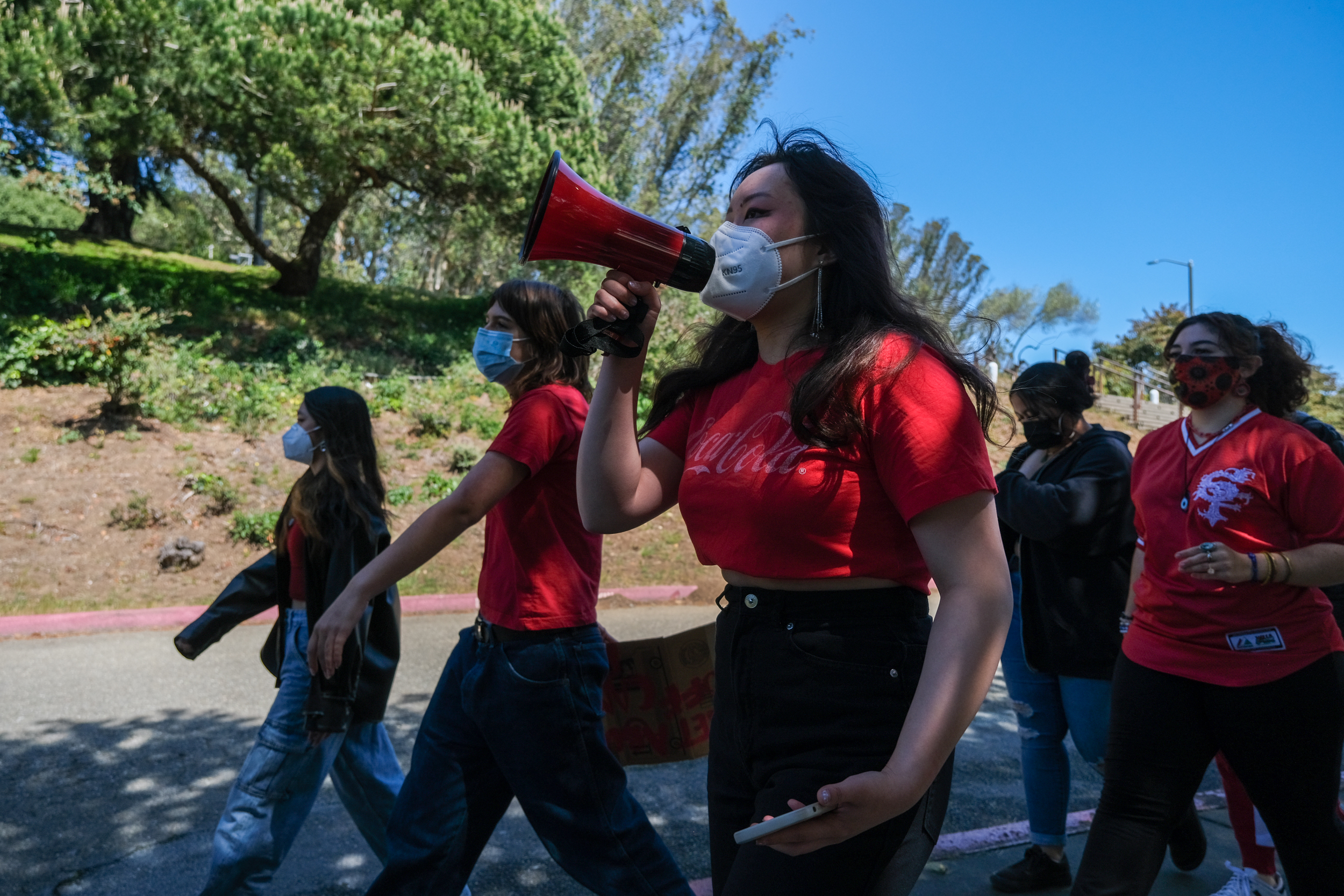Roughly one year after San Francisco public high school students began protesting over inadequate administrative responses to sexual harassment and assault, their demands have largely been unmet.
That’s what more than a dozen students said at a Board of Supervisors committee hearing on Thursday called by Supervisor Myrna Melgar to determine what role the city plays and what more it can do to intervene.
Student organizers at the hearing renewed their demands to the San Francisco Unified School District for enshrining lessons about consent over verbal and physical interactions in health curriculum starting in elementary school, mandatory consent orientation for all student athletes and the requirement that athletic coaches undergo the same training as district employees.
Making information about Title IX—a federal civil right outlawing sex-based discrimination in education—accessible to students through posters on campus and in digital school platforms along with ensuring a list of resources is given to survivors by mandated reporters were also called for by the students.
“No real tangible change was seen,” said Isabella Hansen, who serves as a student delegate to the district’s Board of Education. “Unfortunately, we still have to see a few of the demands shared implemented at our schools.”
Under changes to Title IX imposed by the Trump administration in 2020, districts are limited to taking action on cases that occurred on campus and under a narrow set of behaviors. It also means an elongated investigative process—during which no punitive actions against an alleged perpetrator can be taken—that burdens staff.
SFUSD expects rules to change again by the 2023-24 school year under the Biden administration.
“These [regulations] have intentionally slowed us down,” Kiki Williams, executive director of SFUSD’s Office of Equity and Employee Relations, told the committee. “It’s going to be another big lift to get everyone trained, to get support to understand the new way of doing things.”
In response to the protests, SFUSD added another investigator to the Office of Equity, created a full-time Title IX coordinator position, launched a Title IX student advisory group and pledged to conduct more training for staff. Williams credited student voices for giving the district the mandate to hire more staff for these efforts in the midst of a budget crisis.
At its Oct. 11 meeting, the school board approved minor changes to its policies around sexual harassment and bullying and general harassment that made simple clarifications to existing language. Williams acknowledged the changes weren’t substantial and that her office didn’t clearly communicate its handling of cases that didn’t rise to the Trump-era Title IX criteria under bullying and harassment instead.
‘Much Further To Go’
During the pandemic, students anonymously shared accounts of alleged abuse, which culminated in an organized demand for change upon returning to in-person instruction.
Students last year said they felt that SFUSD’s response to their demands for more serious response to allegations and robust support for survivors, including more health education and information about their rights, went unmet. But they are pushing on with their movement to shift cultural norms such as crafting toolkits and forming clubs against sexual assault and harassment.
Several students, many from Mission High School, voiced concerns over personal safety and mistrusting adults in coming forward. One student said they experienced sexual assault but didn’t enter the Title IX process for fear it would cause more harm and shame rather than bring her justice.
Students also urged better health education at younger ages and all throughout high school, plus targeted intervention toward athletes and coaches.
While many calls for change are spurred by allegations against students, responses to allegations against faculty have also drawn scrutiny.
Sexual abuse allegations against a former George Washington High School athletic director made public in September rocked the district. Two women stepped forward in a suit against SFUSD, alleging that Lawrence Young-Chet Chan separately groomed and sexually abused both of them when they were students.
The district placed Young-Chet Chan on leave in May 2017, public records show, as officials investigated the allegations. A settlement entered three months later allowed him to resign and barred him from suing SFUSD. That same year, a former physical education teacher at John O’Connell High School retired with pension after a student accused him of sexual assault and at least 30 female students alleged misconduct, the SF Examiner reported.
“We do want to give credit where credit is due,” said student delegate Cal Kinoshita. “However, we have much further to go.”
Have you or someone you know experienced sexual harassment or assault? Here are a few resources that can help:
- La Casa De Las Madres | Drop-in center: 1269 Howard St. | Teen 24-Hour Crisis Line: 1 (877) 923-0700
- Asian Women’s Shelter | 24-Hour Crisis Line: 1 (877) 751-0880
- Child Adolescent Support Advocacy Center | (415) 206-8386
- Seneca Mobile Response Team | 1 (877) 305-8989
